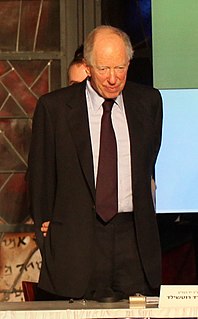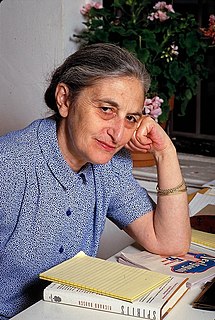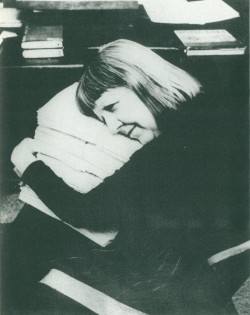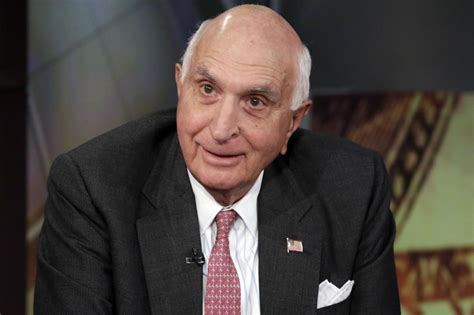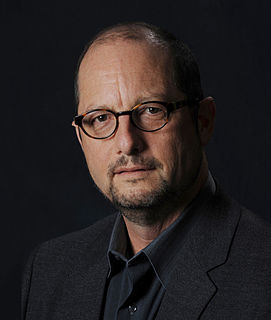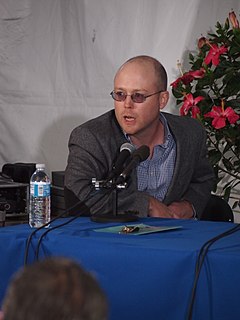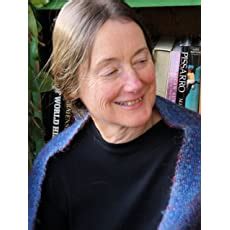Top 101 Eliot Quotes & Sayings - Page 2
Explore popular Eliot quotes.
Last updated on April 19, 2025.
I started moving away from poets like Wallace Stevens and Hart Crane and started reading poets like, again, Karl Shapiro, Howard Nemerov, Philip Larkin, and the British poets who were imported through that important anthology put together by Alvarez - and those would include Thom Gunn and Ted Hughes. And I think these poets gave me assurance that there were other ways to write besides the rather involuted style of high modernism whose high priests were Pound, Eliot and Stevens, and Crane perhaps.
The sad fact is that I love Dickens and Donne and Keats and Eliot and Forster and Conrad and Fitzgerald and Kafka and Wilde and Orwell and Waugh and Marvell and Greene and Sterne and Shakespeare and Webster and Swift and Yeats and Joyce and Hardy, really, really love them. It’s just that they don’t love me back.
Insofar as I think about postmodernism at all, and it doesn't exactly keep me awake at nights, I think of it as something that happens to one, not a style one affects. We're postmoderns because we're not modernists. The modernist writers?Pound, Eliot, Joyce, Stevens, Yeats, Woolf, Williams?spoke with a kind of vatic authority: they were really the last of the Romantics, for whom authorship itself was like being a solitary prophet in the wasteland.
When I say that George Eliot has long been my hero, I mean to include those aspects of her thought and temperament that have been disparaged or dismissed or ignored. She was, after all, a novelist who did not eschew politics or polemics - sometimes silently though defiantly, as in her relationship with George Henry Lewes.
Perhaps the central question about [Eliot] Porter's work is about the relationship between science, aesthetics, and environmental politics. His brother, the painter and critic Fairfield Porter, wrote in a 1960 review of [Porter's] colour photographs: 'There is no subject and background, every corner is alive,' and this suggests what an ecological aesthetic might look like.
Love never dies a natural death. It dies because we don't know how to replenish its source. It dies of blindness and errors and betrayals. It dies of illness and wounds; it dies of weariness, of witherings, of tarnishings. Anaïs Nin I like not only to be loved, but also to be told I am loved. George Eliot Love is the voice under all silences, the hope which has no opposite in fear; the strength so strong mere force is feebleness: the truth more first than sun, more last than star.
It would be inappropiate, undignified, at 38, to conduct friendships or love affairs with the ardour or intensity of a 22 year old. Falling in love like that? Writing poetry? Crying at pop songs? Dragging people into photobooths? Taking a whole day to make a compilation tape? Asking people if they wanted to share your bed, just for company? If you quoted Bob Dylan or TS Eliot or, god forbid, Brecht at someone these days they would smile politely and step quietly backwards, and who would blame them? Ridiculous, at 38, to expect a song or book or film to change your life.
But you know, where did the Brontes go to college? Where did George Eliot go to college? Where did Thomas Paine or Thomas Jefferson or George Washington go? Did George Washington go to college? This idea which we now have that people ought to have these credentials is really ridiculous. Where did Homer go to college?
You see that in the news constantly; done both the right way and the wrong way. The most recent example I can think of, obviously, is Lance Armstrong, who got it all wrong. Who wanted to apologize strategically, instead of abjectly. What got me interested was the repetitive nature of it. There's something so ritualized about it. Then the ritual needs to be reenacted very carefully and pretty frequently - Tiger Woods, and now Manti Te'o and Lance Armstrong, and a little earlier Anthony Weiner or Eliot Spitzer.
Who did she know in Raleigh who took the time off to fix a house? Or read Whitman or Eliot, finding images in the mind, thoughts of the spirit? Or hunted dawn from the bow of a canoe? These weren't the things that drove society, but she felt they shouldn't be treated as unimportant. They made living worthwhile.
The writers I care about most and never grow tired of are: Shakespeare, Swift, Fielding, Dickens, Charles Reade, Flaubert and, among modern writers, James Joyce, T. S. Eliot and D. H. Lawrence. But I believe the modern writer who has influenced me most is Somerset Maugham, whom I admire immensely for his power of telling a story straightforwardly and without frills.
The noonday devil of the Christian life is the temptation to lose the inner self while preserving the shell of edifying behavior. Suddenly I discover that I am ministering to AIDS victims to enhance my resume. I find I renounced ice cream for Lent to lose five excess pounds... I have fallen victim to what T.S. Eliot calls the greatest sin: to do the right thing for the wrong reason.
[P]eople need to use their intelligence to evaluate what they find to be true and untrue in the Bible. This is how we need to live life generally. Everything we hear and see we need to evaluate—whether the inspiring writings of the Bible or the inspiring writings of Shakespeare, Dostoevsky, or George Eliot, of Ghandi, Desmond Tutu, or the Dalai Lama.
I began as a poet, moved to short fiction, then to novel writing, and, for the past twelve years, back to stories. I sometimes wonder if the pendulum will swing all the way back to where I began. As T.S. Eliot says, "In my end is my beginning," but for now I'm staying put, sitting tight, and loving the short story form way too much to leave it quite yet.
Without those forerunners, Jane Austen and the Brontes and George Eliot could no more have written than Shakespeare could have written without Marlowe, or Marlowe without Chaucer, or Chaucer without those forgotten poets who paved the ways and tamed the natural savagery of the tongue. For masterpieces are not single and solitary births; they are the outcome of many years of thinking in common, of thinking by the body of the people, so that the experience of the mass is behind the single voice.
Writers in the nineteenth century - people like George Eliot and Flaubert - were accustomed to addressing particular communities with which they shared not only linguistic meanings but also an experience and history. Those communities have progressively split in the twentieth century, and grown more heterogeneous, and writers emerging from minority communities have found themselves addressing audiences closer to their experience and history - a phenomenon derided by conservative white men as identity politics and multiculturalism in the arts.
Rebecca Mead's My Life in Middlemarch is a wise, humane, and delightful study of what some regard as the best novel in English. Mead has discovered an original and highly personal way to make herself an inhabitant both of the book and of George Eliot's imaginary city. Though I have read and taught the book these many years I find myself desiring to go back to it after reading Rebecca Mead's work.
Great literature has always been written in a like spirit, and is, indeed, the Forgiveness of Sin, and when we find it becoming the Accusation of Sin, as in George Eliot, who plucks her Tito in pieces with as much assurance as if he had been clockwork, literature has begun to change into something else.
April is the cruelest month, T.S. Eliot wrote, by which I think he meant (among other things) that springtime makes people crazy. We expect too much, the world burgeons with promises it can't keep, all passion is really a setup, and we're doomed to get our hearts broken yet again. I agree, and would further add: Who cares? Every spring I go out there anyway, around the bend, unconditionally. ... Come the end of the dark days, I am more than joyful. I'm nuts.
A great deal of anthropological/ethnological literature describes indigenous peoples who live in oneness with the natural world and one another. Survival itself necessitates a borderlessness between inner and outer worlds. At times we still feel a return to that unified state. T.S. Eliot’s designation of our return is ‘through the unknown remembered gate.'
Russell's prose has been compared by T.S. Eliot to that of David Hume's. I would rank it higher, for it had more color, juice, and humor. But to be lucid, exciting and profound in the main body of one's work is a combination of virtues given to few philosophers. Bertrand Russell has achieved immortality by his philosophical writings.
I think the whole emphasis in England, in universities, on practical criticism (but not that so much as on historical criticism, knowing what period a line comes from) this is almost paralysing. In America, in University, we read - what? - T. S. Eliot, Dylan Thomas, Yeats, that is where we began. Shakespeare flaunted in the background. I'm not sure I agree with this, but I think that' for the young poet, the writing poet, it is not quite so frightening to go to university in America as it is in England, for these reasons.
I had no one to help me, but the T. S. Eliot helped me. So when people say that poetry is a luxury, or an option, or for the educated middle classes, or that it shouldn’t be read at school because it is irrelevant, or any of the strange stupid things that are said about poetry and its place in our lives, I suspect that the people doing the saying have had things pretty easy. A tough life needs a tough language – and that is what poetry is. That is what literature offers – a language powerful enough to say how it is. It isn’t a hiding place. It is a finding place.
I would not have majored in English and gone on to teach literature had I not been able to construct a counterargument about the truthfulness of fiction; still, as writers turn away from the industrious villages of George Eliot and Thomas Hardy, I learn less and less from them that helps me to ponder my life. In time, I found myself agreeing with the course evaluations written by my testier freshman students:'All the literature we read this term was depressing.' How naive. How sane.
Every poet gets to choose what kind of community he or she serves with the poems, and it's true that there is a community for very difficult, challenging poetry. It's a community that's established itself over the last 80 years, that was originally, in effect, really started by T. S. Eliot and Ezra Pound. They believed that poetry ought to contain learning, that it ought to rise upon all the learning that went before.


